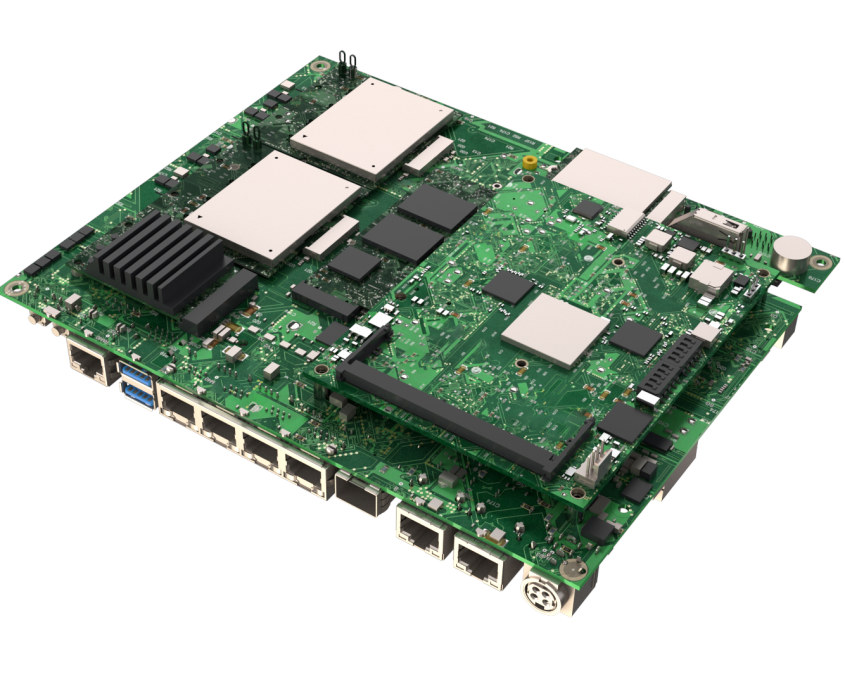 Last year, SolidRun introduced ClearFog CX LX2X networking single board computer offering up to 100GbE via NXP LX2160A 16-core Cortex-A72 communication processor that followed ClearFog CX 8K ARMADA 8040 networking board launched the year before.
Last year, SolidRun introduced ClearFog CX LX2X networking single board computer offering up to 100GbE via NXP LX2160A 16-core Cortex-A72 communication processor that followed ClearFog CX 8K ARMADA 8040 networking board launched the year before.
The Israeli company is now working on two ClearFog CX CN9K networking SBC’s powered by CEx7 CN913x system-on-module featuring Marvell Octeon TX2 CN913x quad-core Cortex-A72 processor and offering multi-gigabit Ethernet with various 10Gbps, 5Gbps, and Gigabit Ethernet ports.
ClearFog CN9132 Pro
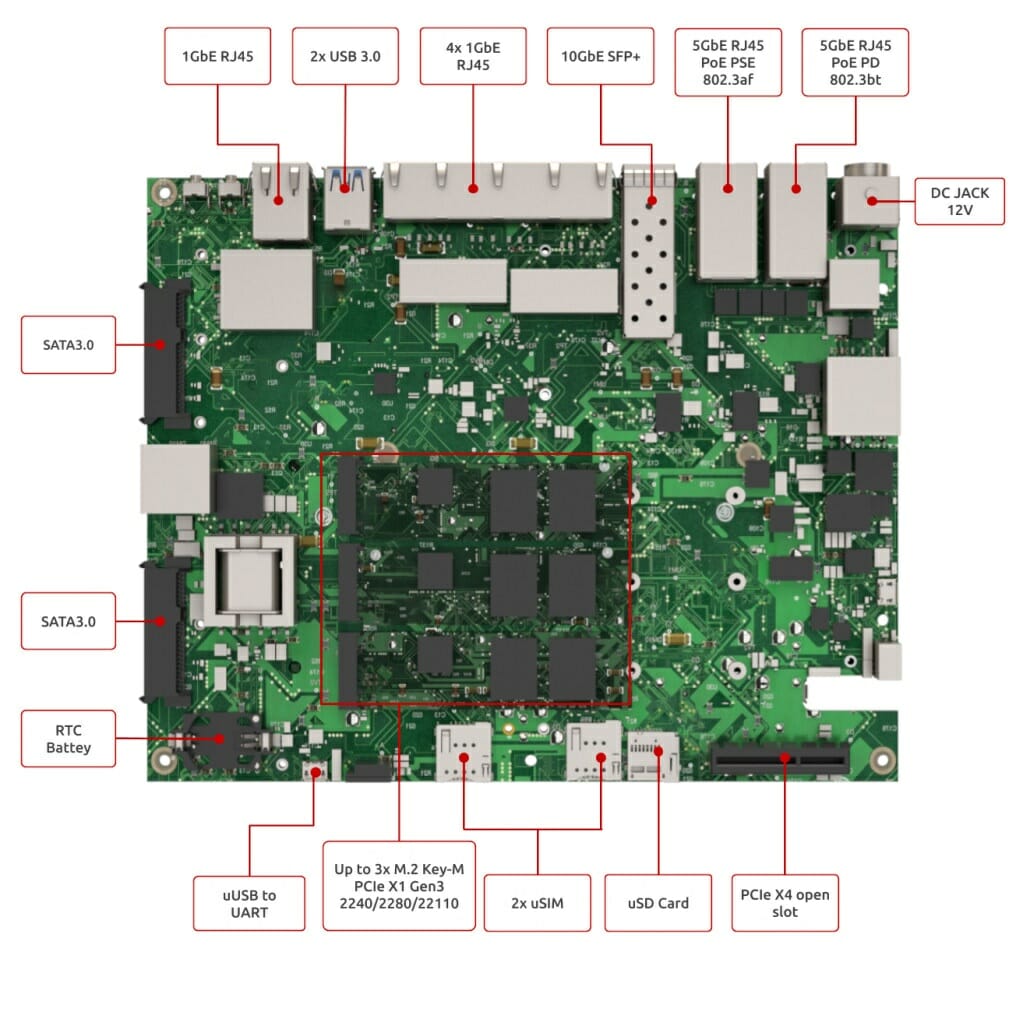
The higher-end version of the ClearFog CX CN9K boards is ClearFog CN9132 Pro with the following specifications:
-
CEx7 CN9132 COM Express Type 7 module
- SoC – Marvell OCTEON TX2 CN9132 quad-core Arm Cortex A72 up to 2.2 GHz (Industrial temperature up to 2.0 GHz)
- System Memory – Up to 16GB SO-DIMM DDR4 up to2400MT/s (not included by default)
- Storage – Up to 32 GB eMMC flash, SPI NOR flash
- COM Express Type 7 board-to-board connectors with
- Storage – 2x SATA (Gen III)
- Networking – 3x XFI, RX AUI, SGMII (configurable SerDes); PPS/PTP (Precision Time Protocol) support
- PCIe
- 1x PCIe Gen 3.0 X4
- 1x PCIe Gen 3.0 X2
- Up to 6x PCIe Gen 3.0 X1
- USB – 1x USB 3.0
- Low-speed I/Os – 5x I2C, 2x UART, SPI bus
- Misc – RTC
- Power Consumption – Up to 15W
- Dimensions – 125 x 95 mm
- Carrier board
- Storage
- 2x SATA (gen 3.0)
- Up to 3x M.2 2240/2280/22110 PCIe x1 Gen3
- 1x M.2 2240/2280/22110 PCIe x2 Gen3
- MicroSD card slot
- Up to 8GB eMMC flash
- Networking
- 1x 10GbE SFP+ cage
- 1x 5GbE RJ45 port with PoE PD
- 1x 5GbE RJ45 port with PoE PSE
- 1 x Gigabit Ethernet RJ45 MDI
- Optional ETH SW with 4x 1GbE RJ45 ports
- PTP (Precision Time Protocol) support
- USB – 3x USB 3.0, 3x USB 2.0
- Expansion – 1x PCIe Gen3.0 X4, open slot (can mechanically support X16)
- Debugging – Micro USB for debug (UART over USB using FTDI)
- Board management – Micro USB to STM32 for management
- Power Supply – 12V via DC jack or PoE PD
- Dimensions – 214 x 172 mm
- Storage
- Temperature Range – Commercial: 0°C to 70°C; industrial: 40°C to 85°C
- Humidity – 10% to 90%
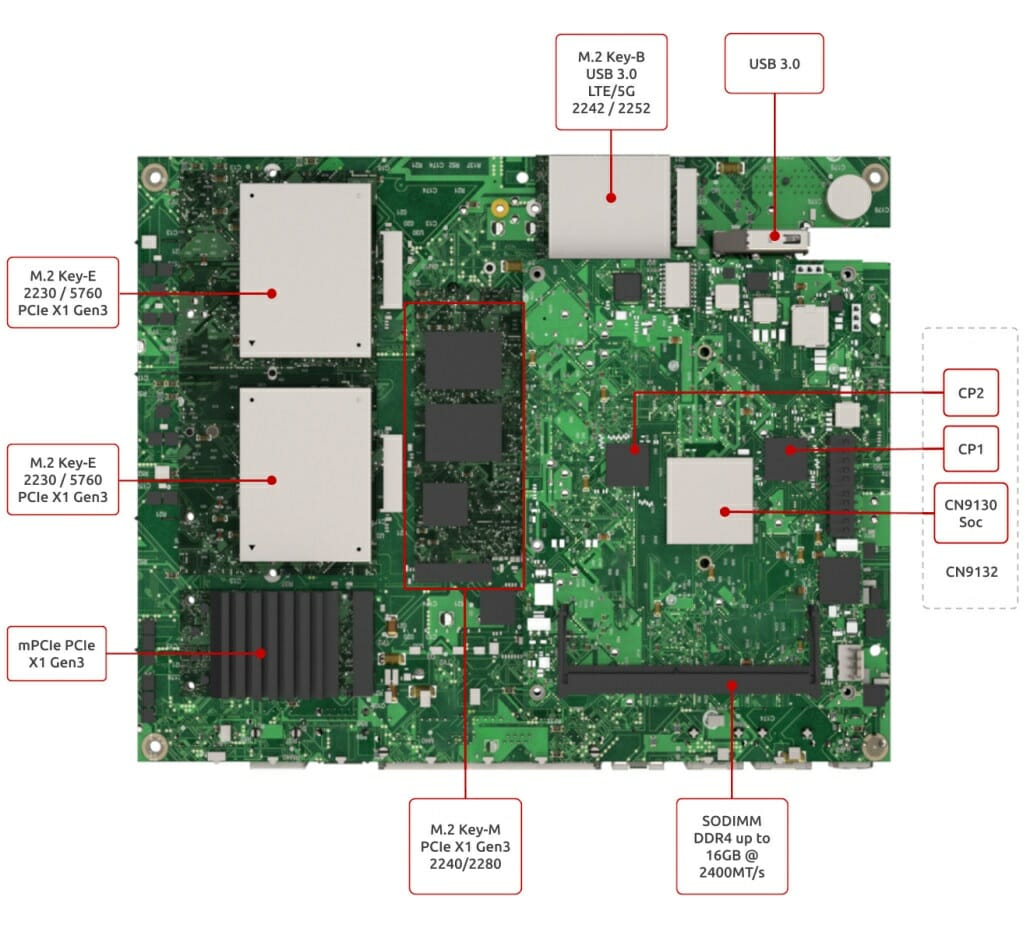 ClearFog CN9130 Base
ClearFog CN9130 Base
If you have a more limited budget or simply lower/different requirements in terms of storage and network connectivity, or power, SolidRun is also working on ClearFog CN9130 Base SBC.
ClearFog CN9310 Base specifications:
-
CEx7 CN9132 COM Express Type 7 module
- SoC – Marvell OCTEON TX2 CN9130 quad-core Arm Cortex A72 up to 2.2 GHz (Industrial temperature up to 2.0 GHz)
- System Memory – Up to 16GB SO-DIMM DDR4 up to2400MT/s (not included by default)
- Storage – Up to 32 GB eMMC flash, SPI NOR flash
- COM Express Type 7 board-to-board connectors with
- Storage – No SATA
- Networking – 1x XFI, RX AUI, SGMII (configurable SerDes); PPS/PTP (Precision Time Protocol) support
- PCIe
- 1x PCIe Gen 3.0 X4
- 1x PCIe Gen 3.0 X1
- USB – No USB 3.0 interface
- Low-speed I/Os – 3x I2C, 2x UART, SPI bus
- Misc – RTC
- Power Consumption – Up to 11W
- Dimensions – 125 x 95 mm
- Carrier board
- Storage
- 1x M.2 2240/2280/22110 PCIe x2 Gen3
- MicroSD card slot
- Up to 8GB eMMC flash
- Networking
- 1x 10GbE SFP+ cage
- 1 x Gigabit Ethernet RJ45 MDI
- Optional ETH SW with 4x 1GbE RJ45 ports
- No PPT (Precision Time Protocol) support
- USB – 2x USB 2.0
- Expansion – 1x PCIe Gen3.0 X4, open slot (can mechanically support X16)
- Debugging – Micro USB for debug (UART over USB using FTDI)
- Power Supply – 12V via DC jack
- Dimensions – 214 x 172 mm
- Storage
- Temperature Range – Commercial: 0°C to 70°C; industrial: 40°C to 85°C
- Humidity – 10% to 90%
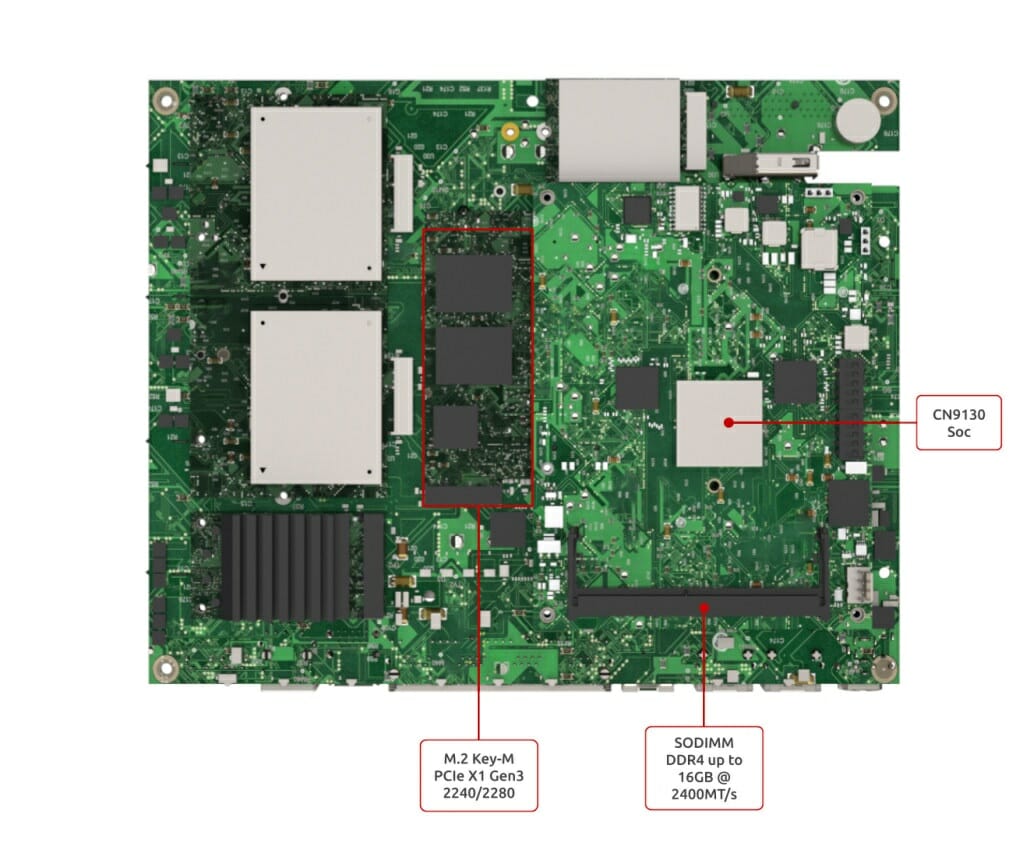 To summarize, there isn’t any SATA port, just one M.2 socket for storage, no USB 3.0 port, no 5GbE PoE port, no STM32 MCU for management, but CPU performance should be the same between CN9132 and CN9130.
To summarize, there isn’t any SATA port, just one M.2 socket for storage, no USB 3.0 port, no 5GbE PoE port, no STM32 MCU for management, but CPU performance should be the same between CN9132 and CN9130.
Software support and additional information
Both boards have the same software support with Marvell-based Linux Kernel 4.14x or mainline Linux, U-boot, UEFI, DPDK, and FreeBSD with the latter relying on third-party support.
Typical use cases include Network Function Virtualization (NFV),
5G base station, transport network infrastructure, industrial switch router, network monitoring, Smart NIC, secure edge gateway, and Cloud & Data Centers.
Both the modules and ClearFog CX CN9K single board computers appear to be under development, and it’s unclear when they’ll become available and at what price. More details can be found on SolidRun website.
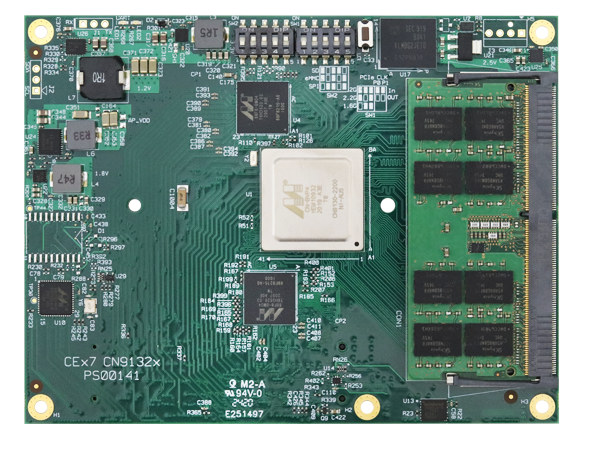
Thanks to miniNodes for the tip.

Jean-Luc started CNX Software in 2010 as a part-time endeavor, before quitting his job as a software engineering manager, and starting to write daily news, and reviews full time later in 2011.
Support CNX Software! Donate via cryptocurrencies, become a Patron on Patreon, or purchase goods on Amazon or Aliexpress


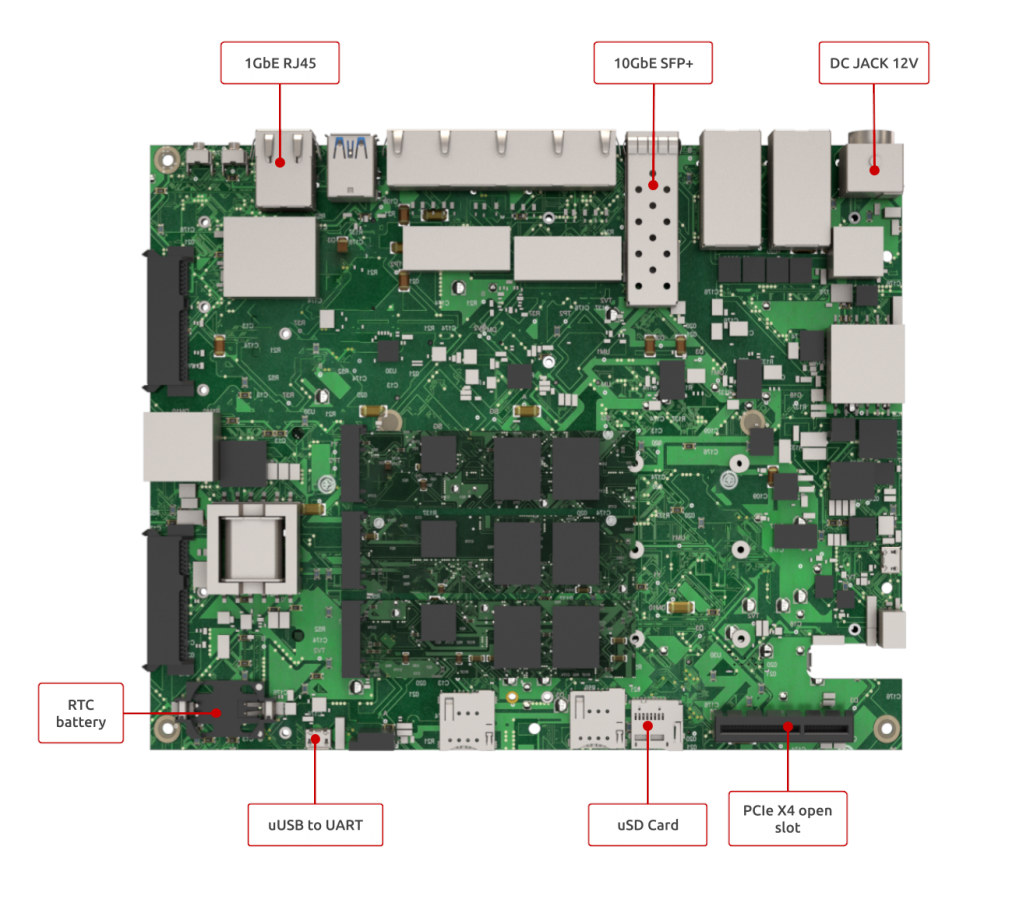



Now *this* looks like a serious NAS board, probably the most serious one in a while!
Actually I could replace my file server with it, it has everything I need. I could even keep the RAID using M2 SSDs, something that even x86 doesn’t provide. I really appreciate having the console accessible by default (without having to keep a hanging TTL adapter).
Actually it’s called TX2 but for me the SoC is an upgrade to the previous A8040, in that the regular TX2 cores are *not* Cortex and don’t support 32-bit mode. And when you look at the TX2 offering, there are 92xx, 96xx, 98xx with plenty of “armv8.2 OCTEON TX2” cores, and next to them is the 9130 with “quad A72”. I guess they managed to more or less fuse their MoChi offering with Cavium’s Octeon offering and present them as a single product line (which is pretty nice as the transition between the two remains quite smooth). At this point it’s obvious we’ll never see the Armada 8080!
I would even not be surprised if the SoC featured above uses the exact same pinout as the 8040!
Yes, this chip was designed before the Cavium acquisition. When the Cavium acquisition happened, the products under development where renamed to reflect the Cavium naming scheme. Definitely a nice upgrade over the A8040.
It’s worth noting that despite the name, the “Octeon TX2 CN91XX” chips are not related to earlier Octeon, ThunderX2 or the CN92XX line of chips, but are the successor to the Armada 8K line that was used in the older ClearFog CX 8K. The new board design seems nicer, with m.2 slots instead of PCIe mini ports and more I/O in the top model. The updates on the CPU side seem very small, it runs the same cores at a slightly higher frequency.
One minor correction: the on-board storage is listed wrong, I think it should be “up to 32GB eMMC” (the default being 8GB), plus NOR flash of unidentified size, rather than 32GB NOR flash. 😉
Agreed for the CPU, that was my understanding as well (we seem to have responded at the same time). With this said, the 8040 is a really powerful SoC that makes you feel more like using a PC than a raspi, and for the same cores and up to the same frequency… The mcbin we have in our lab don’t have much problem pushing between 10 and 20G of TCP traffic! I’d say 10G is easy, 20G is harder. And that’s with 100% mainline. To date they remain the best ARM boards I’ve used in many aspects, so I expect these new ones to be in the same vein.
Looks really good but I think it’s going to be the same price as a thousand orangepis 😉
Well the older ClearFog CX LX2K Is $1000.00 without ram !
https://shop.solid-run.com/product/SRLX216S00D00GE064C06CH/
Or
ClearFog GT 8K https://shop.solid-run.com/wp-content/uploads/2019/08/marvell-sq.png Compare
Quad 2GHz ARMADA A8040
8GB eMMC
0° to 70° C | Inc. Heatsink
SKU: SRM8040S64D00GE008V11GH
$221.00
I hope it won’t be more expensive than a Macchiatobin, it’s basically the same with connectors rearranged. And it’s possibly less expensive to produce if they can mix baseboards with CPU modules.
Having now looked at the pictures of both just now this does look a lot like the macchiatobin with the SoC moved to a module. Maybe it’ll be a hundred orangepis or less.
If only 10Gb switches etc weren’t so expensive 🙁
10G switches are not *that* expensive if you pick those having only two 10G SFP+ uplinks. You can then have 10G to your server, 10G to your workstation and the rest of the network at 1G per port. I used to do this decades ago with 24x100M+2x1G and it was great.
Example: 2x10G + 8x1G fanless for 130 EUR: https://www.fs.com/fr/products/90130.html
Precision Time Protocol is PTP not PPT, aka IEEE1588. The 802.1AS subset is associated with Time-Sensitive Networking, also of high interest esp for industrial&auto applications.